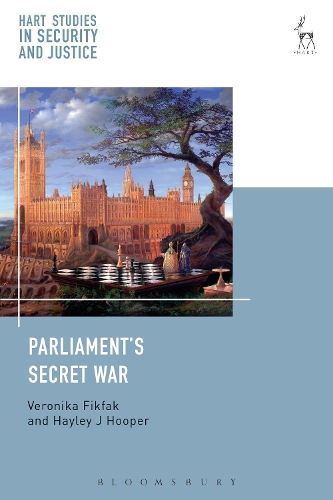
Parliaments Secret War
(Paperback)
Available Formats
Publishing Details
Parliaments Secret War
By (Author) Veronika Fikfak
By (author) Hayley J Hooper
Bloomsbury Publishing PLC
Hart Publishing
25th June 2020
United Kingdom
Classifications
Tertiary Education
Non Fiction
342.41
Physical Properties
Paperback
272
Width 156mm, Height 234mm
386g
Description
The invasion of Iraq in 2003, and the Coalition Governments failure to win parliamentary approval for armed intervention in Syria in 2013, mark a period of increased scrutiny of the process by which the UK engages in armed conflict. For much of the media and civil society there now exists a constitutional convention which mandates that the Government consults Parliament before commencing hostilities. This is celebrated as representing a redistribution of power from the executive towards a more legitimate, democratic institution. This book offers a critical inquiry into Parliaments role in the war prerogative since the beginning of the twentieth century, evaluating whether the UKs decisions to engage in conflict meet the recognised standards of good governance: accountability, transparency and participation. The analysis reveals a number of persistent problems in the decision-making process, including Parliaments lack of access to relevant information, government legalisation of parliamentary debates which frustrates broader discussions of political legitimacy, and the skewing of debates via the partial public disclosure of information based upon secret intelligence. The book offers solutions to these problems to reinvigorate parliamentary discourse and to address government withholding of classified information. It is essential reading for anyone interested in war powers, the relationship between international law and domestic politics, and the role of the Westminster Parliament in questions of national security.
Reviews
The literature on parliamentary control of military action has blossomed since the predictably ill-fated war in Iraq. Parliaments Secret War represents its clear high point. It is exceptionally well researched, intellectually well rounded, and responds fully to the challenge it sets itself, showing why the war powers convention falls short and making a compelling case for reforms which might remedy some of its current failings. -- Paul F Scott, School of Law, University of Glasgow * Public Law *
By any measure, this is an excellent book. It is innovative, timely, thorough, and challenges orthodoxy in a sustained, compelling, and methodical way. Bringing together research from both domestic and international legal scholarship gives the book depth and nuance. -- Leah Trueblood, St Hildas College, University of Oxford * Law Quarterly Review *
The book is a timely, comprehensive, and necessary study of how Britain constitutionally decides to go to war, or, how the House of Commons is and should be involved in the decision to send British troops into harms way... The books core message that we must strive to keep in good health the political constitution, that we must continue to expose and scrutinise those hidden power structures will resonate not only with those concerned specifically with the issue of domestic accountability arrangements vis--vis UK war powers, and the place of the nascent War Powers Convention within these arrangements. The book will be of interest to those keen to understand how the UKs constitutional machinery continues to evolve against the backdrop of pressing issues of contemporary constitutional import, more broadly. -- Mark Bennett, School of Law and Social Justice, University of Liverpool * Legal Studies *
Author Bio
Veronika Fikfak is Fellow and Lecturer in Law at Homerton College, University of Cambridge. Hayley J Hooper is Fellow in Law at Christ Church, University of Oxford.
